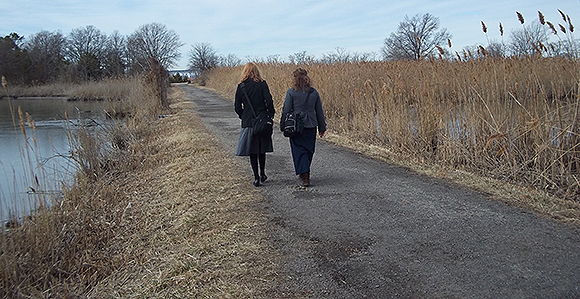Viewpoint: Rise to the Call to Serve God
Contributed By the Church News

Sister missionaries walk down a country road. The call to serve comes to every disciple of Christ who is willing to give his or her best effort in whatever task he or she is assigned to labor within his or her branch, ward, or stake.
Article Highlights
- Where you are assigned doesn’t matter as much as your willingness to serve that qualifies you for the work.
“It is up to us to carry on the rich tradition of devoted commitment that has been the hallmark of previous generations of Latter-day Saints. This is not a time for the spiritually faint of heart. We cannot afford to be superficially righteous.” —Elder M. Russell Ballard of the Quorum of the Twelve Apostles
On March 10, 1899, a 19-year-old young man named Joseph Rudolph Jeppson from Millville, Cache County, Utah, accepted a call to serve as a missionary assigned to labor in the Southern States Mission. His acceptance letter reads:
“First Presidency, Dear Brethren,
“I received your letter, on the forth. And it fills me with pleasure, to respond to the call, to fill a mission, to the Southern States. It is agreeable, with my feelings and I can go, in October. I feel well in the Gospel, and know of no better better place for me, than the mission field. Trusting that I may ever remain your brother, in the Gospel. Joseph R. Jeppson” (The Early Mormon Missionaries database).
Jeppson was set apart as a missionary on October 18, 1899, and served in the Southern States Mission from October 1899 to May 1901. His words, “it fills me with pleasure, to respond to the call,” highlight an important lesson about being called to the work of the Lord.
“Every year tens of thousands of young men and young women, and many senior couples, eagerly anticipate receiving a special letter from Salt Lake City,” said Elder David A. Bednar of the Quorum of the Twelve Apostles during the April 2017 general conference. “The content of the letter affects forever the person to whom it is addressed, as well as family members and a great number of other people. Upon arrival, the envelope may be opened neatly and patiently or ripped apart excitedly with great haste. Reading this special letter is an experience never to be forgotten” (“Called to the Work”).

This letter is more than a simple piece of paper—it represents hard work, time spent at appointments with a doctor and a dentist, and meeting with a bishop and stake president. Most important, the letter represents a person’s worthiness and a willingness to devote 18 months to two years to full-time service.
“The letter is signed by the President of The Church of Jesus Christ of Latter-day Saints, and the first two sentences read as follows: ‘You are hereby called to serve as a missionary of The Church of Jesus Christ of Latter-day Saints,’” Elder Bednar taught. “‘You are assigned to labor in the [blank] mission.’
“Please note that the first sentence is a call to serve as a full-time missionary in the Lord’s restored Church. The second sentence indicates an assignment to labor in a specific place and mission. The important distinction expressed in these two sentences is essential for all of us to understand.”
Elder Bednar differentiated between being called to the work and the assignment to labor in an area.
“We often talk of being called to a country such as Argentina, Poland, Korea, or the United States,” Elder Bednar said. “But a missionary is not called to a place; rather, he or she is called to serve.”
The distinction of a call to serve and a specific assignment reaches beyond the mission field—it is a pattern for service in the Church. Just as a missionary serves in a new place with different people, many times Church members are assigned to a calling in which they don’t “know the area” or the people with whom they will serve.
Where a person is assigned—as a missionary, visiting or home teacher, nursery leader, Sunday School instructor, Relief Society president, or bishop of a ward—doesn’t so much matter; rather, it is a person’s willingness to serve that qualifies a person for the work.
As the Lord declared through the Prophet Joseph Smith in 1829 in the famous missionary anthem in Doctrine and Covenants section 4, “If ye have desires to serve God ye are called to the work” (verse 3).
Thankfully, the Lord is patient with His followers and doesn’t expect perfection. Rather, just as He does with His missionaries, He takes whoever is willing and puts them to work.
The call to serve comes to every disciple of Christ who is willing to give his or her best effort in whatever task he or she is assigned to labor within his or her branch, ward, or stake.
In other words, we determine if we are willing to be called to the work, and the Lord, through His servants, determines where we serve. The combined effort of many being willing to serve and work together helps build the Lord’s kingdom here on the earth.
President Thomas S. Monson has told a story about a young men’s basketball team and how a smart leader used all of the boys who were willing to play.
“I remember in my youth a basketball team from the Twenty-fifth Ward of the Pioneer Stake that had 10 young men participating,” President Monson said in his October 1991 general conference talk. “A wise leader decided not to play just the five best, with the other five substituting here and there. Rather, he formed two teams with balanced ability and age. One team of five played the first and third periods, while the remaining team of five played the second and fourth periods. It was not a contest between bench warmers and active players, but a situation where morale was high, playing time was equal, and games were played and won in the right spirit” (“Called to Serve”).
Like the wise leader, the Lord utilizes all “players” regardless of their skill level.
Elder M. Russell Ballard of the Quorum of the Twelve Apostles said during his October 2008 general conference address: “This is a great time to live, brothers and sisters, and it is up to us to carry on the rich tradition of devoted commitment that has been the hallmark of previous generations of Latter-day Saints. This is not a time for the spiritually faint of heart. We cannot afford to be superficially righteous. Our testimonies must run deep, with spiritual roots firmly embedded in the rock of revelation. And we must continue to move the work forward as a covenanted, consecrated people, with faith in every footstep, ‘till the purposes of God shall be accomplished, and the Great Jehovah shall say the work is done’ (History of the Church, 4:540)” (“The Truth of God Shall Go Forth”).
Let us all rise to the call to serve Him in whatever assignment we are given.
